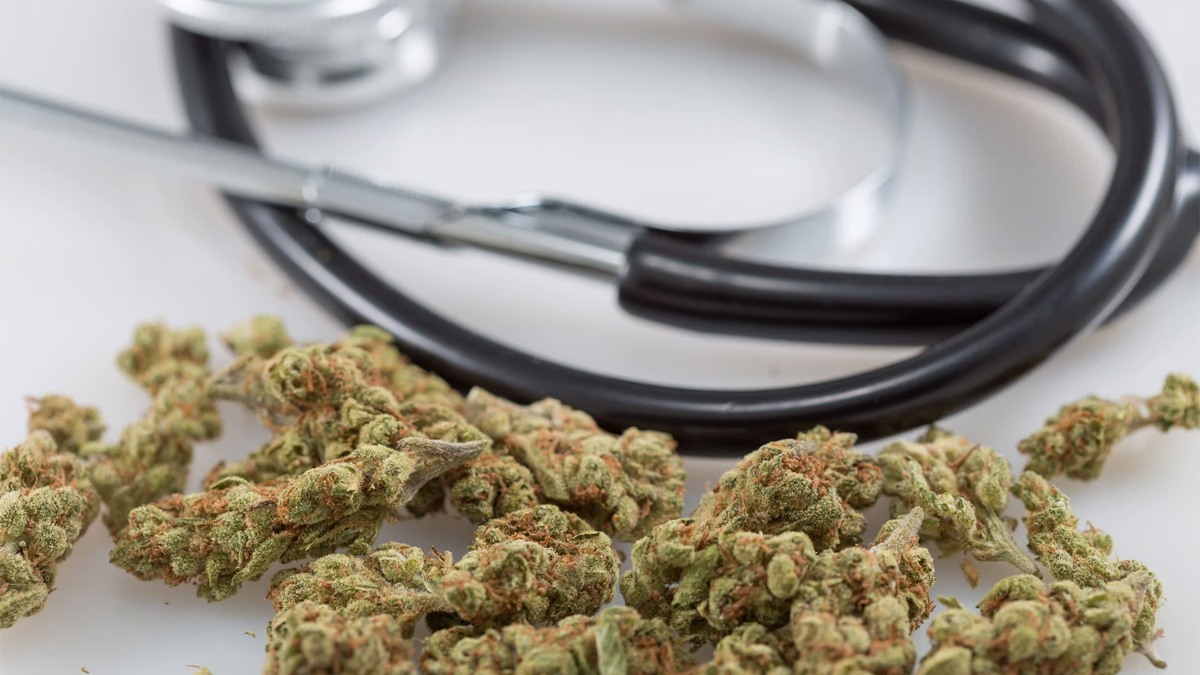Photo courtesy of Chris Wallis // Side Pocket Images.
Results of a new yearlong study of prescribed medical marijuana for patients with chronic pain and mental health issues observed an association between cannabis use and symptom improvement, with most side effects limited to dry mouth and sleepiness. At least some of the benefits appeared to fade as the 12-month study period went on, however.
The report, published in the Journal of Pain and Palliative Care Pharmacotherapy, evaluated the effects of medical marijuana on 96 patients over the course of the yearlong observational study, with measurements of pain, depression, anxiety and sleep problems taken at three, six and 12 months.
“We found that the use of medical cannabis was associated with reduced pain during the first 6 months and improved mental well-being over 12 months,” wrote authors, from the University of Melbourne in Australia. “Patients reported not only less pain but also experienced reduced interference from pain in their daily functions. Furthermore, they reported decreased use of pain medications and a large proportion felt that their pain symptoms had significantly improved, as reflected in their reported changes in the severity of pain.”
There are “clear associations between patient commencement of a prescribed medicinal cannabis product and improvements in pain, mental health and sleep difficulties.”
Relief offered by cannabis may not be everlasting, however. The report, which was funded by the government of Victoria, Australia, notes that “by the end of 12-months, some of these benefits appeared to wane.”
“Overall, our results are encouraging in relation to the short term treatment of pain and mental health symptoms,” researchers concluded, “but long-term effects, especially in terms of pain, appear uncertain.”
Even at 12-month mark however, beneficial effects were reported by most patients. More than 9 in 10 (91 percent) said their pain was at least “a little better,” while 3 in 4 said it was either “much better” or “very much better.”
In terms of reductions in conventional pain medications, the greatest reduction was similarly seen at the midpoint in the study, with effects seeming to lessen in the latter half of the study. But even after 12 months, more than half (55 percent) of participants reported decreases in prescription pain medication use, while nearly half (45 percent) said they were taking less over the counter pain medication.
“Significant improvements were noted across diverse domains of symptom interference on daily functions, suggesting an improved quality of life for patients.”
The three-person team offered a few reasons why medical marijuana may have become less effective for some patients in the latter portion of the study. “For example,” they wrote, “chronic exposure to THC has been reported to lead to the desensitization and downregulation of CB1 receptors, which may result in reduced CB1 agonist activity and therefore, could contribute to the overall diminishing therapeutic effects of cannabis over time.”
Another explanation, they said, could be that pain and mental health conditions are “mediated by distinct pathways and receptor systems” in body and that chronic use of medical marijuana “may induce changes in these receptor systems.”
It’s also possible that some conditions, such as cancer, might progress in such a way that symptoms worsen regardless of the effectiveness of medical cannabis.
Improvements to mental health symptoms, by contrast, did not appear to fade as noticeably, although patients’ reported benefits did plateau after the first three months. Nevertheless, participants overwhelmingly reported that cannabis reduced the severity of depression, anxiety and sleep issues at least to some degree, and majorities said even at the 12-month evaluation that marijuana made those symptoms “much better” or “very much better.”
The majority of reported side effects were mild, the study found:
“Overall, dry mouth was the most prevalent side effect across all groups, with sleepiness following closely. An increased appetite was observed more frequently in the ‘Balanced’, ‘THC dominant’ and ‘Mixed’ groups. The feeling of being high was lowest in the ‘CBD dominant’ group and increased with a heightened THC:CBD ratio. Across all time points, the majority of reported side effects were mild (55.6%), followed by moderate (30.8%) and severe (13.7%).”
While the new findings align with those of some other past studies, authors noted that investigations looking into cannabis for pain management over a period of longer than six months are rare. They emphasized a need for future longitudinal and controlled studies “to better understand the sustained effects of cannabis-based medications on pain and mental health.”
As more states have legalized medical marijuana, pain has been a top qualifying condition in most jurisdictions. That’s backed up by reports from patients and health care providers indicating that cannabis is an effective tool for pain management.
A recently published review of research on marijuana and chronic nerve pain, for example, concluded that treatment with cannabinoids offers “significant relief from chronic pain” with “minimal to no side effects”—potentially providing patients a “life-changing alternative” to conventional pharmaceuticals.
“The positive effects of cannabinoids in pain management are clear and their merit in the treatment thereof is evident,” says the research, published last month in the journal Cureus. It adds that “the fact that cannabinoids are natural garners it support over traditional synthetic and semi-synthetic drugs.”
Authors considered thousands of research papers for the review, ultimately including in their analysis five placebo-controlled randomized control studies published between 2000 and 2024. They found that treatment with cannabinoids offered markedly more pain relief than did placebo.
“Compared to placebo, cannabinoids provided significant relief from chronic pain (33% vs 15%) as measured by the visual analog scale,” the paper says. “The transdermal application of CBD led to a more pronounced reduction in sharp pain, according to the neuropathic pain scale. Minimal to no side effects were recorded, further highlighting the potential benefits of cannabinoids.”
A research letter published last month by the American Medical Association, meanwhile, found that 71 percent of chronic pain patients and 59 percent of physicians are in favor of nationally legalizing medical cannabis. The study involved interviews with 1,661 chronic pain patients and 1,000 doctors. It was partly funded by the National Institute on Drug Abuse (NIDA).
“Overall, people with chronic pain were more supportive of the policies that would expand access to medical cannabis, and providers were more supportive of the policies that would restrict access to medical cannabis,” said Elizabeth Stone, the lead author of the study at the Rutgers Institute for Health, Health Care Policy and Aging Research.
Meanwhile, the National Cancer Institute (NCI) also recently published a wide-ranging series of scientific reports on marijuana and cancer as part of an effort to better understand “core questions” around patients’ relationship with cannabis—including sourcing, cost, behavioral patterns, patient–provider communications and reasons for use.
One of the studies looked specifically at patients who use medical marijuana as an alternative to opioids to treat their cancer-related pain.
Another study published last month found that patients who used medical marijuana for three months improved on a variety of health-related quality of life (HRQoL) measures, including physical functioning, bodily pain, social functioning, fatigue and general health.
Patients who used a CBD vaginal suppository in a separate trial, meanwhile, also reported significantly reduced menstrual pain and related symptoms. Participants who used the CBD suppository generally reported less period pain, better mood and lower use of pain medications compared to subjects who underwent conventional treatment.
A study published this summer, meanwhile, found that more than half (57 percent) of patients with chronic musculoskeletal pain said cannabis was more effective than other analgesic medications, while 40 percent reported reducing their use of other painkillers since they began using marijuana.
Among those who said they used cannabis to manage pain, the most commonly used cannabinoid was CBD (39 percent), followed by a hybrid of multiple cannabinoids (20 percent). But almost a quarter (23 percent) said they were unaware of their cannabis’s composition.
Yet another study last year, published by the American Medical Association, found that the use of medical marijuana was associated with “significant improvements” in quality of life for people with chronic conditions like pain and insomnia—and those effects were “largely sustained” over time.
Keep out of reach of children. For use only by adults 21 years of age and older.










